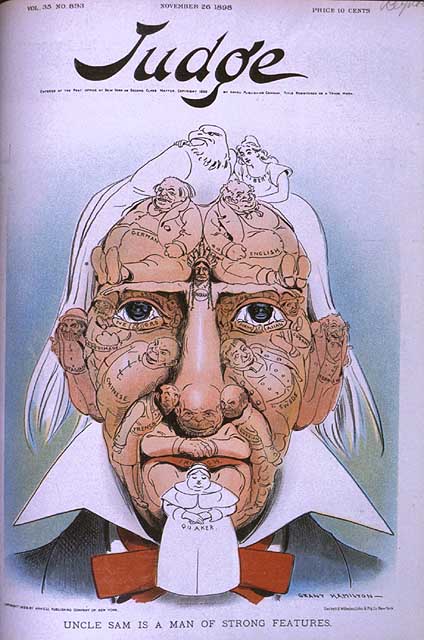2) In Bourne's excerpt, he referred to several specific activities and items to be the "most rudimentary American," for example the "American culture of the cheap newspaper, the "movies," the popular song, the ubiquitous automobile." He believed that these actions and activities were done by what he deemed the typical American. What do you consider to be some symbolic American activities that we practice nowadays?
3) More than once, Bourne has used the term "the Anglo Saxon." Who is he really referring to?
4) Do you agree with Bourne? Do you feel like every culture should keep their own traditional beliefs? Do you feel like each and every nationality should assimilate into the American culture completely now that they are in a new land? What are some specific changes that you feel are necessary to assimilate into America?
5) What do you think Bourne would have to say about today's generation? Was the melting pot successful?

As I reflect back on the fourteen years I have been living in the United States, I could instantly recall the memory of being exposed to an environment where the weather, language, culture, and tradition differed significantly from the lifestyle I was familiar with in the past. Now I realized that while I was adapting to the norms of the American life and culture, subconsciously, I was also changing the way I perceived Indonesia, the place I once called home. Eventually I realized that not only was I beginning to forget the Indonesian language, but I was also building a greater ignorance towards my own heritage. My mother, who is also a native of Indonesia, is not fond of the way I allow my ego to boast about the American culture. In fact, whenever I take pride in being a citizen of America she is the first person to remind me that I was born and raised in Indonesia. Although my mother is not completely resistant of the American culture, she and I have our disagreements about the things we value. In fact, she has a hard time accepting my desires to marry someone outside of our ethnic group. As a daughter I never want to disappoint my mother, at the same time, we live in a country where one can freely express his or her beliefs. Thus, I am one of the "half-breeds" who Bourne characterizes as people "who retain their foreign names but have lost the foreign savor" (4). As a hyphenated American, the need to assimilate into the American culture while having to maintain some allegiance to my Indonesian roots is one of the most difficult struggles I have yet to overcome.
ReplyDeleteTo some extent, Bourne would be satisfied with the way our multicultural nation has allowed various ethnic groups to express their cultural identity. For example, by examining the ethnic makeup of communities in New York City, it is evident that many ethnic groups "have remained distinct" for they cooperate "to the greater glory and benefit, not only of themselves but of all the native 'Americanism' around them" (4). On the other hand, Bourne would not be pleased with the way the American culture and ideas of "American exceptionalism" hold precedence over foreign cultures today. I believe that patriotism in the United States of America is stronger now then ever. This is especially true after 9/11. For since this tragic attack on America, people have been identified as either American or un-American. Therefore, even though our nation is vastly diverse, the pressure to assimilate into the greater American culture still exists today. This is because our views of immigration are so fixed on legal issues of documentation that we often forget to acknowledge the traditions and cultures that immigrants bring with them.
1) Living in America, I do believe I have lived life very differently than I would of in Hong Kong, where I was born. One of the biggest sacrifices I have made to assimilate to a new country was the decision to adopt a Western nickname. My birth name is Wai Yan, however I had never really learned to appreciate the beauty behind that name whilst living in America. I had always only wanted an American name, something really Western and beautiful like the names "Adriana," "Madeline," or "Elizabeth." Afterall living in America, there was no simpler way to assimilate than by first having a name that actually sounded American. And as I learned over the years, apparently my birth name "Wai Yan" was too "difficult" to pronounce. Thus, I had never really learned the meaning behind my own name, nor appreciated the value of it. It wasn't until I was a lot older, and learning more about my own ethnicity and culture, that I found out that my birth name was actually a very beautiful and meaningful blessing from my parents. Each character (word) in Chinese has a meaning, and my name Wai Yan was two seperate characters, meaning Wisdom and Prosperous. When my parents had given me that name, they had hoped to bless me with those traits and good fortune. When I learned about that, my view on my Chinese name changed. I appreciated it, and loved it because I knew it was out of a parents love to want to wish for the best for their child. After learning about that though, I won't deny that I still adopted a Western nickname, Adeline, but I had also at the same time loved my Chinese name. I would go by a Western name for probably the entirety of my life, but I would never want to legally change my name to it. Afterall, it does represent my culture, and it is what makes me, me :)
ReplyDelete